|
|
|
Sort Order |
|
|
|
Items / Page
|
|
|
|
|
|
|
| Srl | Item |
| 1 |
ID:
128139
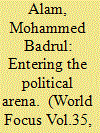

|
|
|
|
|
| Publication |
2014.
|
| Summary/Abstract |
The Indian community in United States is one among many ethnic communities, which have been increasingly visible in the last four decades. Although the flow of Indians as new ethnic started first as a trickle in 1895, their impact was really felt in the aftermath of the landmark 1965 immigration legislation. This new immigration groups has begun to attract academic attention and has to been the focus of research by a number of scholars.
|
|
|
|
|
|
|
|
|
|
|
|
|
|
|
|
| 2 |
ID:
128138
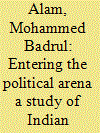

|
|
|
|
|
| Publication |
2014.
|
| Summary/Abstract |
The Indian community in United States is one among many ethnic communities, which have been increasingly visible in the last four decades. Although the flow of Indians as new ethnic started first as a trickle in 1895, their impact was really felt in the aftermath of the landmark 1965 immigration legislation. This new immigration groups has begun to attract academic attention and has to been the focus of research by a number of scholars.
|
|
|
|
|
|
|
|
|
|
|
|
|
|
|
|
| 3 |
ID:
126162
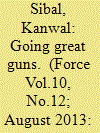

|
|
|
|
|
| Publication |
2013.
|
| Summary/Abstract |
In the last decade the biggest change in the complexion of our foreign relations has been with the US. The general attitude in India has become markedly positive towards the US. In return, bi-partisan support now exists in the US for enhanced ties with India, expressed at times with much rhetoric.
|
|
|
|
|
|
|
|
|
|
|
|
|
|
|
|
| 4 |
ID:
135440
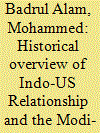

|
|
|
|
|
| Summary/Abstract |
Both India and the United States are stable democracies – one the largest in the world, the other the oldest. From America’s standpoint, post-World War II, a new democratic regime in India was counted upon as a strategic ally for containing Soviet influence in Asia. Yet, India refused to be an ally of the US. Strongly allied with Britain through both World Wars, the United States had a policy of ambivalence towards colonial India.
|
|
|
|
|
|
|
|
|
|
|
|
|
|
|
|
| 5 |
ID:
142137
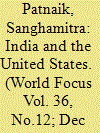

|
|
|
|
|
| Summary/Abstract |
US President Barack Obama defined Indo-US relations as “one of its most important relationships in an uncertain world”. According to J. Tellis, Senior Associate at the Carnegie Endowment for International Peace, Washington D.C., in the backdrop of damage caused by the Khobragade affair, he hoped that both India and United States “will not forget that the special courtesies extended to one another reflects their desire for a stronger strategic bond and hence must not be measured by any picayune notions of mechanistic reciprocity. President Barack Obama is the first U.S. President to visit India twice during office, and is also the first U.S. President to be the chief guest at the Republic Day. ‘Shared Effort; Progress for All’ added a new dimension to Indian foreign policy towards the United States. It envisioned the extensive bilateral strategic and global partnership between the two countries. The pledge of these two major democracies of the world to carry forward their partnership across the spectrum of human endeavor to better their citizens’ lives and that of the global community will certainly set the stage for world peace and security.
|
|
|
|
|
|
|
|
|
|
|
|
|
|
|
|
| 6 |
ID:
126700
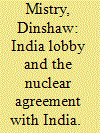

|
|
|
|
|
| Publication |
2013.
|
| Summary/Abstract |
IN JULY 2005, REVERSING DECADES OF U.S. nuclear nonproliferation policy, President George W. Bush announced a commitment to attaining "full civilian nuclear energy cooperation and trade with India."1 In November 2006, Congress passed the Henry J. Hyde United States-India Peaceful Atomic Energy Cooperation Act and, in October 2008, approved the necessary follow-on legislation, to formally permit civilian nuclear trade with India. The nuclear agreement with India was a major U.S. foreign policy initiative, and Indian Americans strongly lobbied Congress to approve this agreement. To some, this advocacy effort heralded the emergence of Indian Americans as a leading ethnic lobby that could substantially influence future U.S. foreign policy
|
|
|
|
|
|
|
|
|
|
|
|
|
|
|
|
| 7 |
ID:
183364
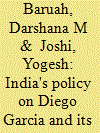

|
|
|
|
|
| Summary/Abstract |
The ongoing contention between Mauritius and the UK over the sovereignty of the Diego Garcia presents a difficult challenge for Indian foreign policy-makers. New Delhi's principled opposition to colonialism and its historical relationship with Port Louis has made it steadfastly support the Mauritian claim. However, such principled foreign policy militates against India's quest to balance the growing Chinese influence in the Indian Ocean. Insofar, Diego Garcia allows the US Navy to maintain an active presence in the Indian Ocean, thereby keeping the Chinese naval power at bay. Balance of power considerations notwithstanding, the expanding trajectory of the Indo-US strategic partnership also demands New Delhi to weigh the burden of its policies on Diego Garcia carefully. This article juxtaposes India's historical record on Diego Garcia during the Cold War with its contemporary approach to the issue. In doing so, it sheds further light on India's strategic decision-making in the Indian Ocean, its dilemmas in confronting a genuinely hostile maritime power in the region, and deliberates on potential options for dispute resolution which can not only satisfy Mauritian demands but also ensure a healthy balance of power in the Indian Ocean.
|
|
|
|
|
|
|
|
|
|
|
|
|
|
|
|
| 8 |
ID:
172207
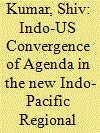

|
|
|
|
|
| Summary/Abstract |
Strengthened Indo-US proximity has become a notable factor in the regional security architecture of the Indo-Pacific region, and also it raises ongoing concerns about its robustness. This article analyses the geostrategic, geoeconomic, security-related and defence-connected Indo-US relations in the region over the last two decades, highlighting the growing multidimensional convergence of US and Indian interests in the Indo-Pacific regional security architecture. In the final part, this article also sketches the future implications of Indo-US proximity and seeks to identify potential risks.
|
|
|
|
|
|
|
|
|
|
|
|
|
|
|
|
| 9 |
ID:
184549
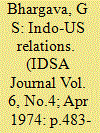

|
|
|
| 10 |
ID:
161790
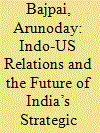

|
|
|
|
|
| Summary/Abstract |
The idea of strategic autonomy has emerged as a cardinal principle of India’s foreign policy in the post-cold war era. As and when India tries to advance her relations with major powers like the US, Russia or China, the principle of strategic autonomy becomes a matter of debate.
|
|
|
|
|
|
|
|
|
|
|
|
|
|
|
|
| 11 |
ID:
142140
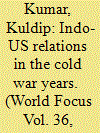

|
|
|
|
|
| Summary/Abstract |
International relations are largely based upon the interplay of conflict and cooperation between and among nations. Every set of relationship is affected by several external factors. Therefore, domestic, regional as well global factors must be considered in analyzing relationship between any two countries. As for Indo-US relations, since days of its freedom struggle Indian leaders were inspired by the American Declaration of Independence and aspired for the American ideas of progress and democracy. The United States, itself a colony of Britain at one time, supported India’s freedom movement to some extent, despite the World War II, which required closed cooperation between Washington and London.
|
|
|
|
|
|
|
|
|
|
|
|
|
|
|
|
| 12 |
ID:
178587
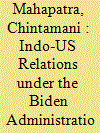

|
|
|
| 13 |
ID:
142135
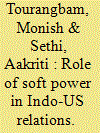

|
|
|
|
|
| Summary/Abstract |
India and America have come a long way since the Cold War era. Both the countries have learned to ‘disagree without being disagreeable’ and are constantly working on the convergences in the relationship. Soft power has been a dominant factor in bringing them closer and will only increase its impact from here on. With dynamic leadership on both the sides, steady economic growth, greater political will and cultural vitality, Indo-US relationship can bring about stability and the ability to weather differences that will also be a part of the relationship. The Indian Diaspora will continue being the torch bearers of ‘Indo-US Bhaichara’, shortening the distance of thousands of miles between both the states. A newfound political intention in Washington DC and New Delhi has helped the states overcome a chequered history of mistrust and build new bridges of understanding. People to people interaction, cultural exchange etc had helped these two societies view each other from different prisms. This vigour is likely to grow, but with the coming US Presidential Elections in 2016, it will be interesting to see what changes it will bring in the relations. A new President with a new administration can make a lot of difference in the relationship. Nevertheless, the Indo-US relations are only likely to grow, even if the momentum and speed might be a little inconsistent.
|
|
|
|
|
|
|
|
|
|
|
|
|
|
|
|
|
|
|
|
|